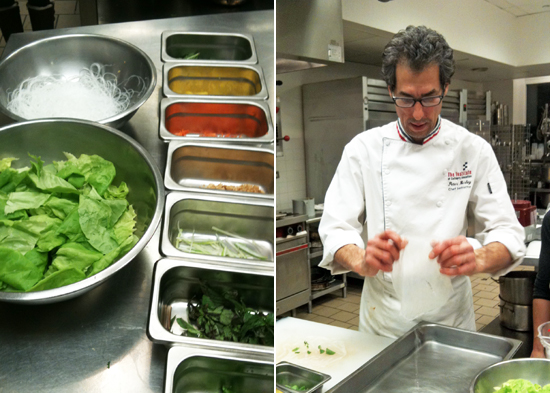I was raised in the kind of household where a meal wasn’t a meal if there wasn’t meat involved. This strategy served me well until I decided to move to Brooklyn.
While the outer-borough that I call home has its fair share of notable butcher shops, I seem to have fallen in with a vegetarian crowd, much to the dismay of my Wyoming-based younger brother and his rancher friends. I was skeptical at first, but over a year later, my eyes have been opened to the fact that there’s a lot more to vegetarian dining than pasta and tofu.

With my newfound appreciation for herbivores, I wanted to take a look at the ICE classrooms and see what tricks I could learn there. Luckily, renowned vegetarian chef Peter Berley was teaching a class called World Party — Vegetarian Style. A couple hours in a vegetarian kitchen taught me a lot about how to create interesting flavor and texture combinations, as well as few tips and tricks:
Work with What You’ve Got: Menus should be designed around your equipment and space, not the other way around. If a recipe calls for a tool (or counter space) you don’t have, find another recipe.
Be a Fry Guy: Deep-frying is a very unique technique that lends a distinct flavor and texture. It’s not for everyday but when you’re deep-frying there are a couple of important rules:
1. Always use refined oil because it prevents the oil from smoking. For example, use canola or vegetable oil, but not olive oil since it has a very low smoke point — the point at which the oil breaks down.
2. Make sure your oil is fresh. Oil can go rancid very easily so be sure to double check before you even bother heating it.
3. Get your oil to about 360°F before you add anything. The ideal frying temperature is 350°F and adding the food will drop the temperature.
Sweetness is Overrated: Chutney is usually thought of in terms of fruits, but in reality its purpose is to be an accompaniment that helps aid digestion. In our class we made Cilantro Chutney that can be used in a wide variety of ways, such as a dip for veggies or crackers.
The Truffle Trend: Truffle oil seems to be everywhere you turn these days, but according to Chef Berley, that’s not a good way to get a truffle flavor as most truffle oil is made of chemically-created truffle scent. Your best bet is to use truffle salt. Just add it at the end of the recipe to maximize the flavor and scent. We added some to our risotto that we stuffed into filo dough triangles for one-bite hors d’oeuvres.
Culture Crossing: Want to make homemade ravioli but you’re in a rush? Chef Berley taught us that wonton wrappers make a perfect substitute. Just stuff and go. While I don’t see myself giving up meat anytime soon (or ever, if we’re being honest) I certainly have a better appreciation for the variety and satisfaction you can get from a meatless meal!



